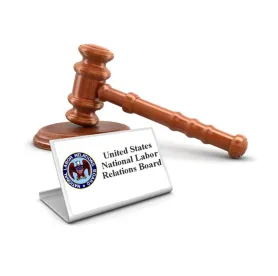On Wednesday, August 30, 2023, the National Labor Board (“NLRB” or “the Board”) issued a pair of decisions—Wendt Corp., 372 NLRB No. 135, and Tecnocap LLC, 372 NLRB No. 136—that highlight the Board’s continued focus on increasing the power of organized labor and limiting employer authority. The Wendt and Tenocap decisions overturn Raytheon Network Centric Systems, 365 NLRB No. 161, and Mike-Sell Potato Chip Co., 368 NLRB No. 145, which allowed employers to unilaterally change employees’ working conditions (during an initial contract negotiating period or while a new contract is being negotiated) so long as such changes were “similar in kind and degree” to the employer’s past practice (i.e., one that happened with “such regularity and frequency” that workers could expect it to happen again).
In Wendt, the Board held that the company violated the National Labor Relations Act (“NLRA”) by not negotiating with the union the layoffs of bargaining unit employees while negotiating an initial collective bargaining agreement, despite the company’s argument that its unilateral decision to do so was consistent with its past practice. The Board found that the company had not established the existence of a sufficient “past practice” to justify its unilateral action. More importantly, the Board concluded (in overruling part of Raytheon) that allowing an employer to unilaterally act as the company had in the past conflicted with the U.S. Supreme Court’s 1962 ruling in NLRB v. Katz, which held that employers cannot unilaterally make changes involving “a large measure of discretion.” According to the Board, permitting such unilateral action by an employer would frustrate the collective bargaining process and discourage companies from reaching an agreement with a union. The Board also emphasized that an employer cannot defend unilateral changes by pointing to past practices that were in place before its workers were unionized.
In Tecnocap, the Board held that a company’s unilateral change to unionized employee work schedules during the period the union and company were negotiating a new collective bargaining agreement violated the NLRA. While the company argued it had done so consistent with its rights in the then-expired collective bargaining agreement (which arguably was permissible under Raytheon), the Board held that an employer’s past practice of making unilateral changes pursuant to an expired management-rights clause cannot authorize new unilateral changes while bargaining for a new agreement is underway.
The new decisions significantly limit the power of employers to act unilaterally while engaged in collective bargaining negotiations with a union and, therefore, increase a union’s leverage. Employers will have to now bargain these decisions and their implementation. In the larger picture, Wendt Corp. and Tecnocap continue the Board’s recent string of decisions and rules designed to increase the power and leverage of organized labor, while restricting employer authority. And the Board may not be done. Board observers expect other significant decisions to be released in the coming days.



 />i
/>i

